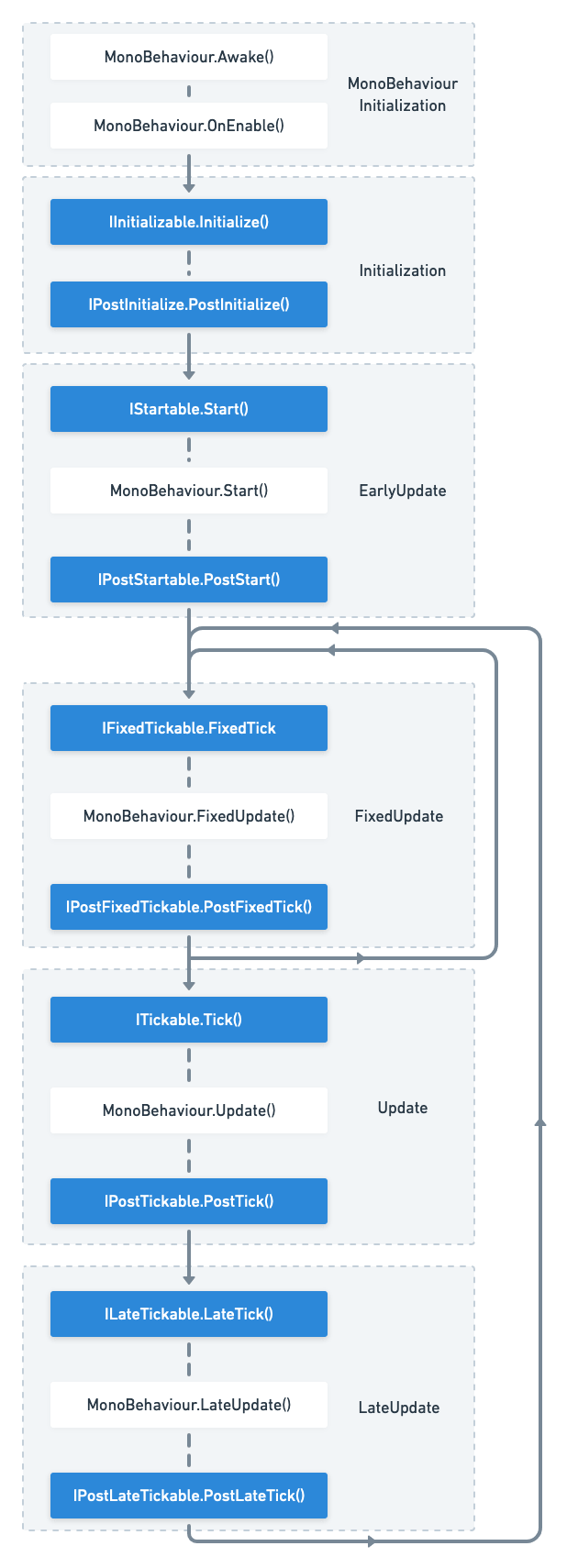Plain C# Entry point
VContainer allows plain C# to be the starting point for application processing. Using it instead of MonoBehaviour, which has a lot of features, can help you build a simple control flow.
class FooController : IStartable
{
void IStartable.Start()
{
// Do something ...
}
}
builder.RegisterEntryPoint<FooController>();
See register
VContainer does this with its own PlayerLoopSystem.
If you register a class that implements the marker interface, it will be scheduled in Unity's PlayerLoop cycle.
Since it uses PlayerLoopSystem, it works even if you register at any time (e.g: IStartable etc)
Available interfaces
| VContainer entry point | Timing |
|---|---|
IInitializable.Initialize() | Immediately after building the container |
IPostInitializable.PostInitialize() | Late IInitializable.Initialize() |
IStartable.Start() | Nearly MonoBehaviour.Start() |
IAsyncStartable.StartAsync() | Nearly MonoBehaviour.Start() |
IPostStartable.PostStart() | After MonoBehaviour.Start() |
IFixedTickable.FixedTick() | Nearly MonoBehaviour.FixedUpdate() |
IPostFixedTickable.PostFixedTick() | After MonoBehaviour.FixedUpdate() |
ITickable.Tick() | Nearly MonoBehaviour.Update() |
IPostTickable.PostTick() | After MonoBehaviour.Update() |
ILateTickable.LateTick() | Nearly MonoBehaviour.LateUpdate() |
IPostLateTickable.LateTick() | After MonoBehaviour.LateUpdate() |
And
IDisposable: With container disposes. (ForLifetime.Singleton/Lifetime.Scoped)

async
IAsyncStartable is available as a variant of IStartable.
It has the same timing as IStartable, but async Awaitable StartAsync() is available.
If you are a UniTask user, you can also choose the UniTask version of StartAsync. UniTask integration
Handle of the exception that was not caught
On the application side, exceptions thrown in processes such as Start() and Tick() cannot be caught outside.
By default, VContainer logs unhandled exceptions as UnityEngine.Debug.LogException.
As another option, you can register a callback for each LifetimeScope.
builder.RegisterEntryPointExceptionHandler(ex =>
{
// ...
});
Default error logging will be skipped if you are using the RegisterEntryPointExceptionHandler.